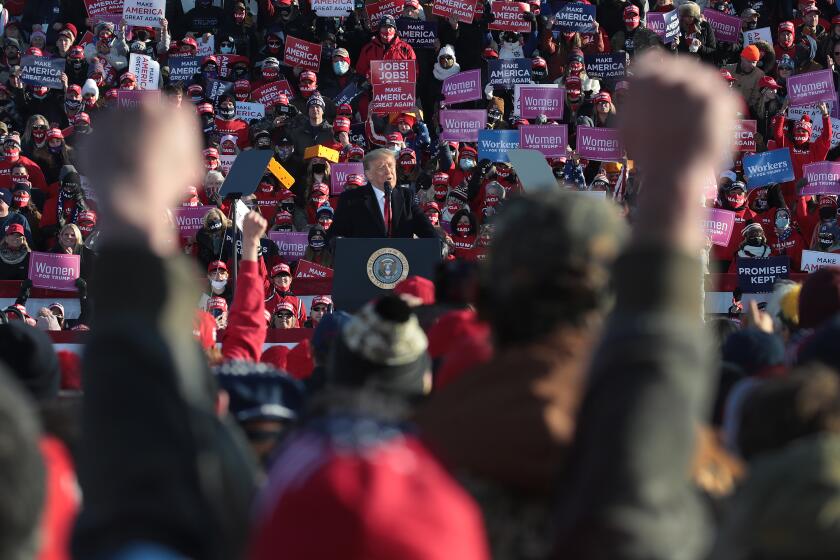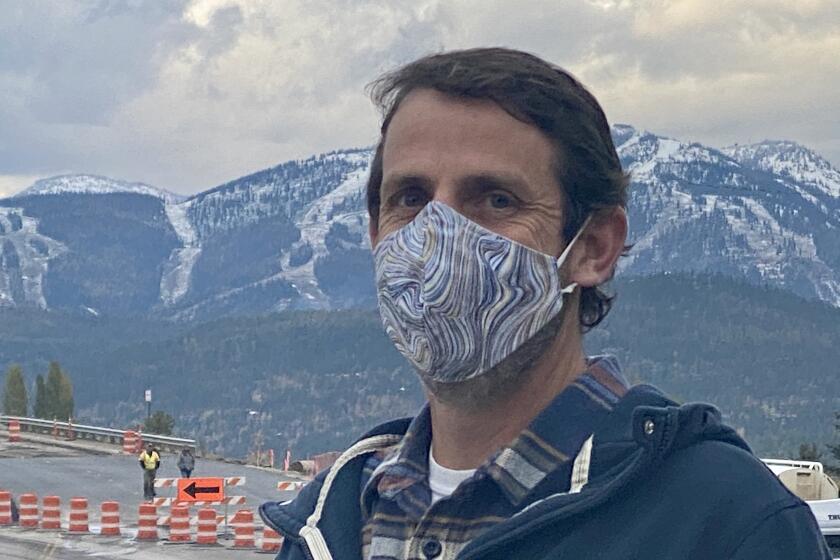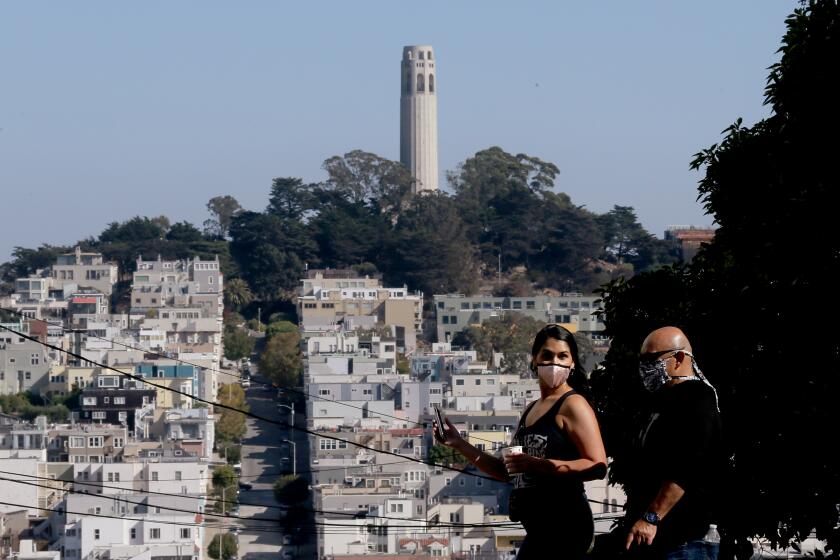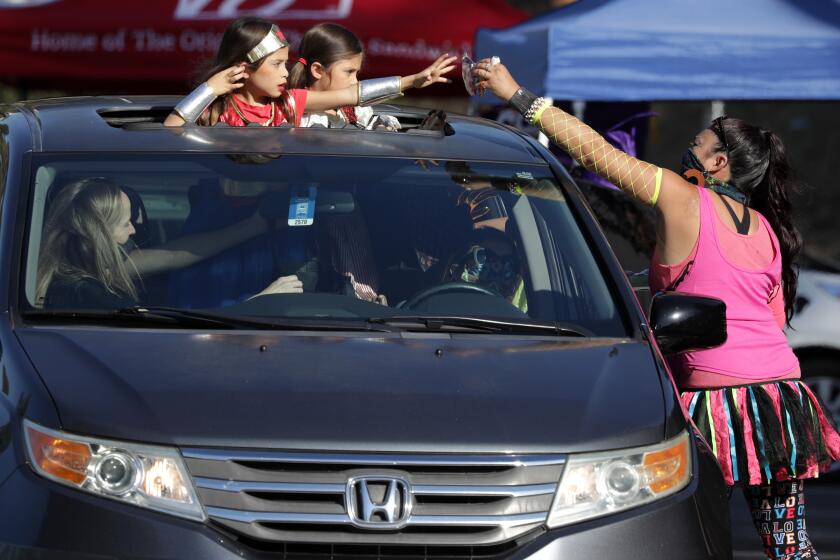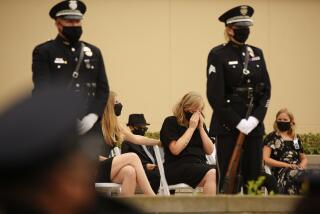A survivor. A funeral director. A marriage divided. How Americans’ COVID experiences shape their votes
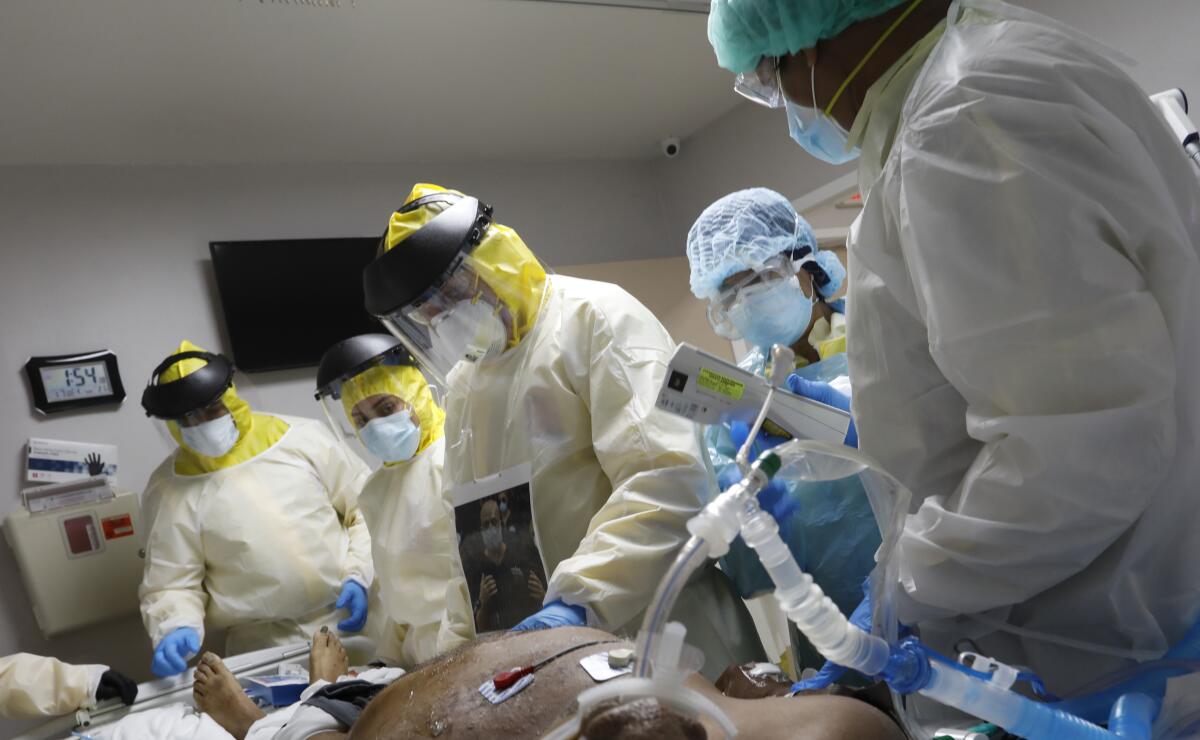
- Share via
In Wisconsin, a funeral home director who has watched the COVID-19 pandemic rip through her community can only blame President Trump.
In Texas, little can change one woman’s loyalty to the president — not even her own struggle for breath as she lay in a hospital bed.
In New Mexico, an underemployed firearms instructor plans to cast his vote as a rebuke to Democrats he says were overzealous in closing businesses.
In Arizona, a Joe Biden voter found political detente with his Republican wife as the lingering effects of infection continue to cause them pain.
In Michigan, a school bus driver won over by the president before the pandemic deepened her devotion and took up arms to protest shutdowns.
Even before the coronavirus sunk in its teeth, the United States was deeply polarized. Facts mattered less than feelings and political parties acted like tribes.
A Stanford study of 18 Trump rallies held in the midst of the pandemic suggests they’ve led to more than 30,000 coronavirus infections and at least 700 COVID-19 deaths.
The virus — a shared, microscopic enemy that demanded a unified response — offered the nation a chance to come together. But from face masks to shutdowns, the pandemic quickly became the main thing Americans were fighting over.
As the death toll grew so did anxieties about who would win the presidency.
Election day arrives as the virus surges like never before, with an average of more than 80,000 new cases reported each day last week — well over previous spikes and up more than 44% from two weeks earlier.
Once concentrated in urban centers like New York and later in Sun Belt states, the virus is now ravaging the rural Midwest and Rocky Mountain states.
Field hospitals have been pitched in parking lots from Texas to Wisconsin. In the past week, hospitalizations reached new highs in 18 different states.
Treatment is improving and infections are increasingly concentrated in younger people with high odds of survival, but experts predict a significant rise in the U.S. death toll, which now tops 230,000.
Towns like Whitefish, Mont., once could afford to view the coronavirus as a distant big-city problem. Not anymore.
The surge poses a dilemma for officials trying to balance health concerns with economic ones as the public grows wary of more forced shutdowns.
Polls suggest that most voters have made up their minds — and record numbers have already cast their ballots.
All of the issues that divided America before coronavirus have been eclipsed.
This is the pandemic election. And these are the stories of five voters.
The funeral home director
The first call came in late March.
A 70-year-old had died shortly after being taken off a ventilator. Michelle Pitts sent a hearse to pick up his body from the hospital.
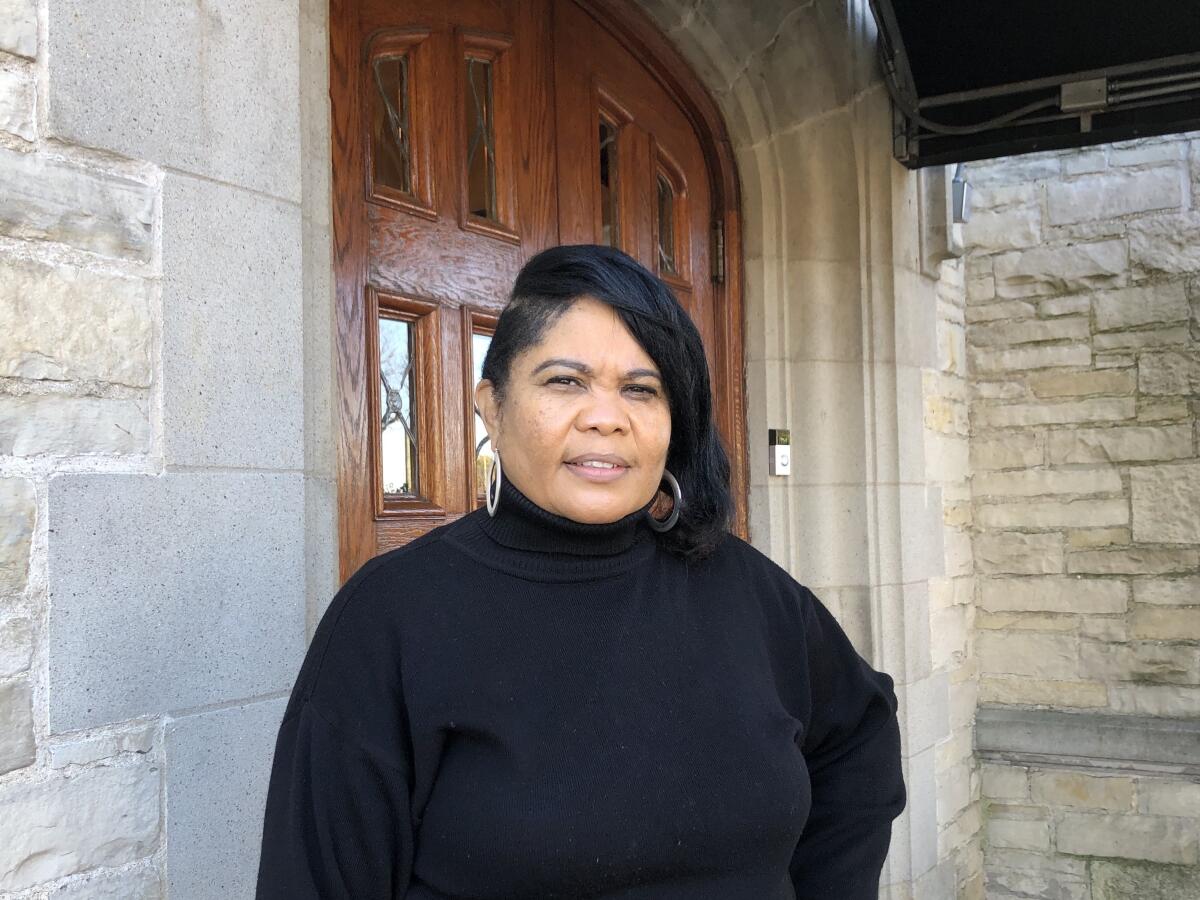
There would be no funeral, just a burial at the cemetery attended by three relatives. The family was too worried about contagion.
Pitts was left with the feeling that “this virus was going to be bad.”
The calls kept coming, at all hours. Pitts could only watch as the coronavirus spread through the neighborhood. As owner of the New Pitts Mortuary, she has been serving the predominantly Black northside of Milwaukee since the 1990s.
The disproportionate toll the virus was taking on Black people was obvious to her. The two dozen victims her funeral home has handled included bus drivers, nurses and grocery clerks — essential workers who didn’t have the luxury of sheltering in place.
“If you live in this community, you know someone who has either contracted the virus, or died,” she said. “It’s an American tragedy plain and simple.”
As the months wore on, Pitts couldn’t stop thinking about the ages of the deceased. Early 50s. Mid-40s. Late 30s.
She herself was 60.
Pitts remembered the expression of the parent standing over the oak casket of a beloved son, who days earlier was taken off a ventilator. She recalled the woman whose husband died before he could line up a life insurance policy to help take care of the couple’s two young children should something happen to him.
How are they doing now, she wondered?
To sustain herself, she often recited her favorite scripture, a section of Psalm 23: “Though I walk through the valley of the shadow of death, I will fear no evil: for thou art with me; thy rod and thy staff, they comfort me.”
In late October, she filled out her ballot.
There was never any doubt that she would vote for Biden. In her view Trump had only responded to the pandemic with callousness.
She deposited the ballot in a nearby drop box.
“I felt like a weight was kind of lifted off my shoulders,” she said. “As if it was my time to be heard.”
— Kurtis Lee
The survivor
It had become her evening ritual: Order dinner from Doordash, mix a cocktail, draw a bath and pretend she was swimming in her complex’s off-limits pool.
“It just became very lonely,” said Jaime Vollmar, 35.
Meanwhile, her hours as an operating room technician at two plastic surgery clinics were severely cut.
It all seemed overblown to Vollmar. She knew friends who had contracted the coronavirus, but nobody who died from it.
Fauci says that, as the coronavirus surges in the U.S., we may have to put off longed-for activities for another year or more.
Then, in early October, Vollmar and her boyfriend decided to take a risk and get together for dinner with another couple. The woman hosting began to feel ill that night, and within days called to tell Vollmar she and her husband had tested positive for the virus.
Vollmar also tested positive.
After two weeks of feeling “like death” at home, Vollmar was admitted to United Memorial Medical Center in Houston. During sleepless nights, she struggled to breathe as she watched a monitor showing her blood oxygen level drop.
She began to wonder: “Am I actually going to survive this?”
Her second priority was making it to the polls to vote in person.
She had supported Trump in 2016 and appreciated all he had done on immigration, the economy, even the pandemic.
“He did a great job. He’s human,” she said, adding that her bout with the virus “gives me more appreciation for him.”
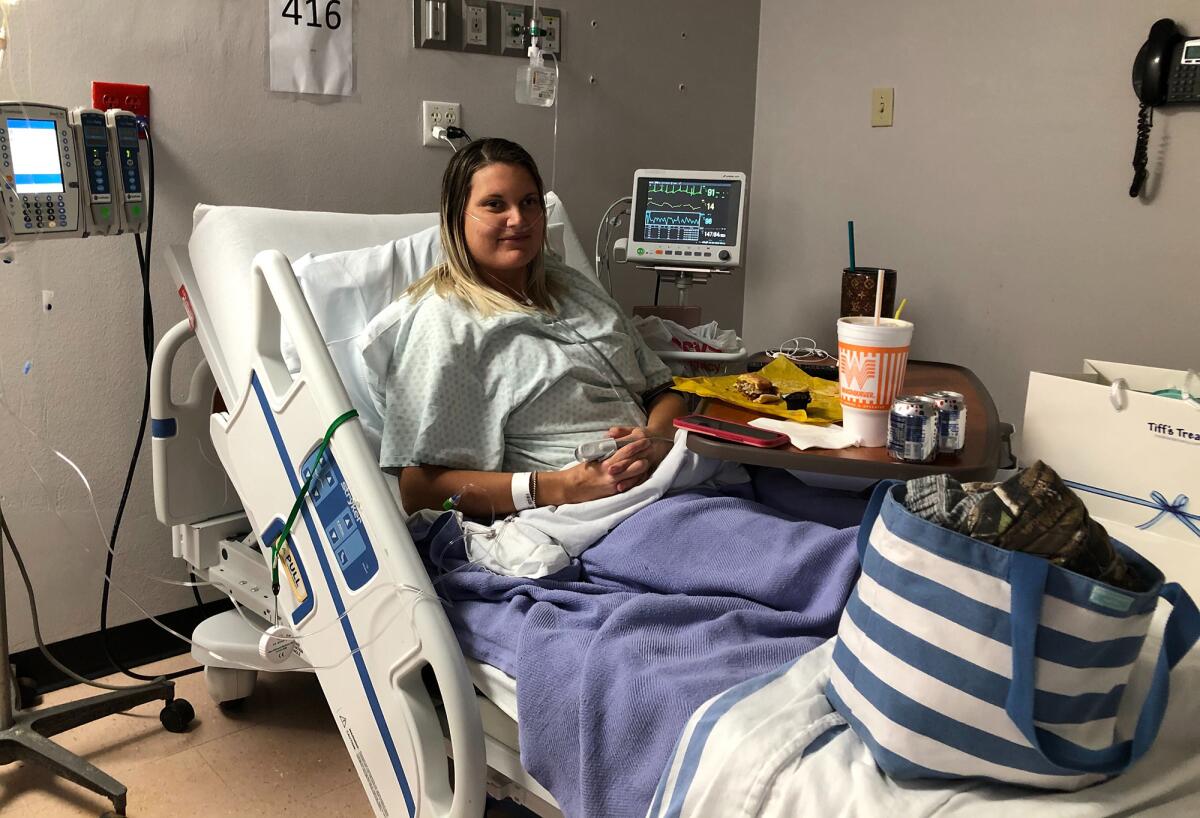
Vollmar was released from the hospital Friday. At the polls, she plans to “be a dork” about safety and wear a mask, keep a distance of six feet and encourage others to take more precautions.
Looking back, Vollmar believes that she might have contracted the virus when she tasted the dinner host’s new vaping flavor — watermelon strawberry bubblegum.
“It was a heavenly flavor,” she said from her hospital bed. “But not worth all this.”
— Molly Hennessy-Fiske
The expectant father
Marcos Sanchez was irked.
Driving by the local hardware store in the early days of the pandemic, he’d see lines of hundreds of people waiting to get in.
Yet Sanchez, a 35-year-old firearms instructor in Española, a small city tucked in the mountains of northern New Mexico, wasn’t allowed to work after an order from the state’s Democratic governor closed all businesses except those deemed essential.
Sanchez, who had been steadily growing his business for two years, had no income for three months straight.
“It’s frustrating because they’re raking in money and I’m struggling,” he said.
Health officials say it’s unlikely Los Angeles County will see any movement on the state’s reopening tiers in the coming weeks.
The way Sanchez sees it, the pandemic was an act of God. The shutdowns were an act of man.
Under current restrictions, he can work again, but must limit his shooting and self-defense classes to a quarter of normal capacity. With a second child on the way, he’s now contemplating whether his business can continue.
“I’m not blind or ignorant to the damage that the virus has done, but I see the damage it’s done economically and that leads to a whole lot of other problems,” he said.
Rio Arriba County, where Sanchez lives, went for Hillary Clinton in 2016 — 64% versus 24% for Trump. But Sanchez plans to vote for Trump, like he did four years ago.
His decision is largely based on his opposition to firearm restrictions and his religious beliefs, particularly his objection to abortion. But the pandemic has also played a role.
Trump is not a perfect candidate, he said. He thinks no candidate ever is. But most important for him are the kinds of policies a person will enact once they are in office, and Trump has opposed widespread economic shutdowns in the face of the virus.
“You have to ask what’s worse,” he said. “The virus or the constant anxiety we’ve been putting ourselves in?”
— Kate Linthicum
The activist
Bill Whitmire had to leave for a doctor’s appointment, but his keys were nowhere to be found.
It’d been months since he felt clear-headed. Lapses in memory and reasoning — so uncharacteristic for a 56-year-old who prided himself on being organized — had become the norm.
He chalked it up to the coronavirus, which he believes he contracted back in January, before testing was available in the United States.
His wife, Ann, came down with the virus in June. She still faces bouts of nausea, body aches and feeling like she has no energy.
The pandemic brought the couple closer together — and not just in their shared suffering.
She is Republican and he is a Democrat, which seemed like less of an issue when they got married back in the 1980s than it did in 2016, when she voted for Trump and he went for Clinton.
“Sometimes we have to agree to disagree,” he said.
Whitmire kept an open mind about Trump in the beginning but grew increasingly disenchanted with him — especially after the pandemic struck.
As a former high school biology teacher, Whitmire was appalled by White House news conferences, in which Trump repeatedly contradicted his own health experts.
“He acts like he’s cured the virus: ‘We’ve rounded the corner, it’ll be over soon, live your life,’” Whitmire said. “Yeah, right.”
For the most part, Whitmire and his wife avoided conversations about Trump and kept focus on their common values of compassion and helping the less fortunate. But it was clear that Ann was losing faith in the president too.
Whenever her husband would turn on a presidential news conference, she would leave the room in disgust.
Anger and grief turned Whitmire into an activist. He joined Marked by COVID, a support group for people who have lost relatives or suffered other effects of the virus. On Friday at the Arizona state Capitol in Phoenix, he lit candles honoring victims and listened as a woman who survived — but lost her sister — sang a haunting rendition of “Amazing Grace.”
“I will never forget it,” he said.
Ann, still ailing, did not attend.
When they they both filled out their ballots in mid-October, he enthusiastically marked his for Biden.
She made him promise not to tell anyone who got her vote, only that it was not Trump.
— Richard Read
The militia member
Michelle Gregoire stood guard outside Karl Manke’s Barber & Beauty Shop with a 9mm semiautomatic pistol and a flag emblazoned “Don’t tread on me.”
Manke had no intention of following state orders to close this past May as coronavirus infections were climbing. Gregoire and dozens of other members of a militia known as the Michigan Home Guard were there to keep out the authorities.
She had long been disillusioned with both major parties. But Trump’s outsider status and unusual political style had appeal.
She reluctantly voted from him in 2016, the same year she made a failed bid for a seat in the Michigan state house as a libertarian.
“I was scared when he took office,” said Gregoire, now 29.
That changed when she got a $16-per-hour job as a school bus driver, plus a bigger tax refund. She and her husband were saving to ditch their rental in Battle Creek to buy a house big enough for them and their three children.
Gregoire was growing more political. She decided to run for a state house seat again — this time as a Republican.
Last November, she joined the militia, which claims to have at least 1,000 members and says on its website that it is preparing “for tyranny, social discord, natural disasters or anything else that may arise.”
The pandemic only fortified her faith in Trump, whose downplaying of the virus reflected her own experience.
“I don’t social distance, I don’t wear a mask,” she explained. “If anybody has COVID, I should have COVID… Nobody around me has tested positive.”
Gregoire lost badly in the August primary for the house seat. She is still jobless, saying that she has not been allowed to return to driving school buses because she is facing charges of trespassing and resisting arrest stemming from her militia’s occupation of the state Capitol in Lansing for a week in May.
But she paid off mounting credit card bills using the $2,400 her family received in checks as part of the federal stimulus package, each accompanied by a letter signed by Trump.
She was planning to vote in-person because it feels more “patriotic.”
— Jaweed Kaleem
More to Read
Sign up for Essential California
The most important California stories and recommendations in your inbox every morning.
You may occasionally receive promotional content from the Los Angeles Times.

